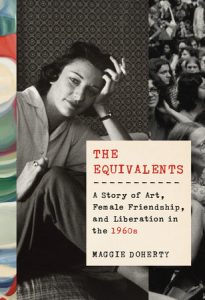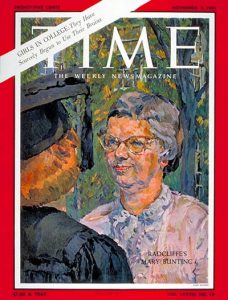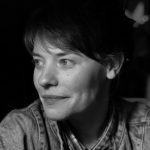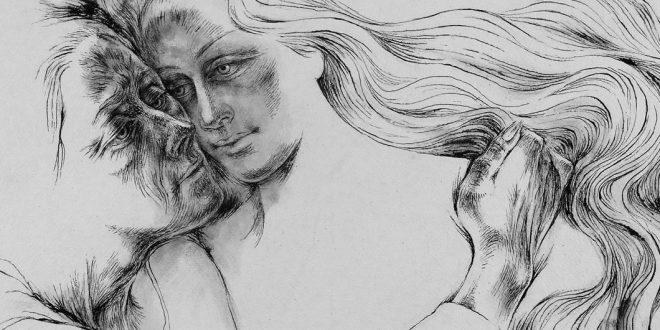Podcast: Play in new window | Download (Duration: 59:01 — 81.0MB)
 In the United States of the 1950s there was a struggle over the very idea of what it would mean to be an American. After World War II, an American could ride high on military power and new technologies. But the Cold War and Nuclear Anxiety undermined the very real economic prosperity being experienced by the growing numbers of the so-called “middle class.” Anxiety and Supremacy yielded a national double-consciousness: While the clarion called for progress, the bell tolled against difference. And along with a fear of homosexuality and communism, those so-called lavender and red menaces, there was a fear that an educated woman might destroy the Great American Family. I’m not sure what color feminism is.
In the United States of the 1950s there was a struggle over the very idea of what it would mean to be an American. After World War II, an American could ride high on military power and new technologies. But the Cold War and Nuclear Anxiety undermined the very real economic prosperity being experienced by the growing numbers of the so-called “middle class.” Anxiety and Supremacy yielded a national double-consciousness: While the clarion called for progress, the bell tolled against difference. And along with a fear of homosexuality and communism, those so-called lavender and red menaces, there was a fear that an educated woman might destroy the Great American Family. I’m not sure what color feminism is.
One such “dangerous experiment” in women’s liberation was the Radcliffe Institute for Independent Study, a program that offered paid fellowships to women with a PhD or “the equivalent” in artistic achievement.
In her book, The Equivalents: A Story of Art, Female Friendship, and Liberation in the 1960s, published by Knopf, Maggie Doherty, tells the story of how five women who received fellowships–poets Anne Sexton and Maxine Kumin, painter Barbara Swan, sculptor Mariana Pineda, and writer Tillie Olsen–formed deep bonds with one another that would inspire and sustain their most ambitious work. They called themselves “the Equivalents.”
The fulcrum of the book is Anne Sexton who shot to fame during her time at the Institute. Sexton believed she should be committed to home and hearth, husband and children, and yet everything about domesticity frustrated her ambitions. In her poem “Housewife,” she writes,
Some women marry houses.
It’s another kind of skin; it has a heart,
a mouth, a liver and bowel movements.
The walls are permanent and pink.
See how she sits on her knees all day,
faithfully washing herself down.
Men enter by force, drawn back like Jonah
into their fleshy mothers.
A woman is her mother.
That’s the main thing.
 Sexton wanted to achieve literary greatness in what was (and is) demonstrably a man’s world. The Institute would give her what she needed to be a great poet: time and friendship; a room and community of her own.
Sexton wanted to achieve literary greatness in what was (and is) demonstrably a man’s world. The Institute would give her what she needed to be a great poet: time and friendship; a room and community of her own.
We begin with the founder of the Radcliffe Institute for Independent Study, Mary Ingraham Bunting, scientist, wife, and mother of four who perhaps assumed that her life was a useful model for women to replicate. But “the Equivalents,” especially Sexton and Tillie Olsen, radicalized the notion of what all kinds of women might want for a fulfilling life beyond the idealized family.
All of our music for the show comes from jazz pianist Jutta Hipp. Born in 1925 in Germany, Jutta Hipp studied painting and listened to jazz in secret, as it was not approved of by the Nazi authorities. After the war she became a touring pianist to support herself. She moved to New York in 1955 and played at the Hickory House in 1956 where she recorded two albums for Blue Note. A studio album with Zoot Sims followed in July of the same year and was her final recording. She dropped out of music, returned to painting, and worked as a seamstress for thirty-five years. She died in Queens in 2003.
 GUEST
GUEST
Maggie Doherty is a literary scholar, historian, and critic based at Harvard, where she earned her PhD in English and where she currently teaches writing, literature, and history. Her writing has appeared in many publications, including The New Republic, The New York Times, n+1, and The Nation. She lives in Somerville, Massachusetts.
RELATED
The Creative Communities That Changed Literature Forever by Maggie Doherty
A Room of One’s Own by Virginia Woolf
Splinters and Mosaics: On women’s history and group biography by Ruth Franklin (book review)
The Brief Career and Self-Imposed Exile of Jutta Hipp, Jazz Pianist by Aaron Gilbreath
Dissecting Male Supremacy: Kate Millett’s Sexual Politics (with Maggie Doherty)
Women and Children First: The Dialectic of Sex (Shulamith Firestone)
Anarchy Is Intersectional: Learning From Emma Goldman
 MUSIC – Jutta Hipp
MUSIC – Jutta Hipp
“Lady Bird”
“Don’t Worry About Me”
“What’s New?”
“The Squirrel”
CREDITS
Producer & Host: Doug Storm
Executive Producer: Kade Young
 WFHB Bloomington Community Radio
WFHB Bloomington Community Radio


